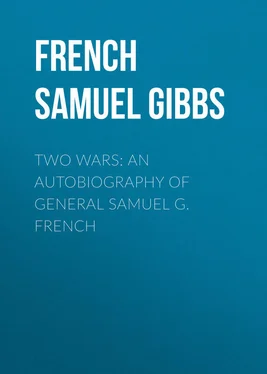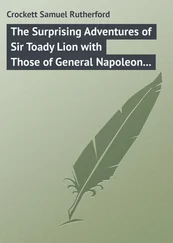Samuel French - Two Wars - An Autobiography of General Samuel G. French
Здесь есть возможность читать онлайн «Samuel French - Two Wars - An Autobiography of General Samuel G. French» — ознакомительный отрывок электронной книги совершенно бесплатно, а после прочтения отрывка купить полную версию. В некоторых случаях можно слушать аудио, скачать через торрент в формате fb2 и присутствует краткое содержание. Жанр: foreign_antique, foreign_prose, на английском языке. Описание произведения, (предисловие) а так же отзывы посетителей доступны на портале библиотеки ЛибКат.
- Название:Two Wars: An Autobiography of General Samuel G. French
- Автор:
- Жанр:
- Год:неизвестен
- ISBN:нет данных
- Рейтинг книги:4 / 5. Голосов: 1
-
Избранное:Добавить в избранное
- Отзывы:
-
Ваша оценка:
- 80
- 1
- 2
- 3
- 4
- 5
Two Wars: An Autobiography of General Samuel G. French: краткое содержание, описание и аннотация
Предлагаем к чтению аннотацию, описание, краткое содержание или предисловие (зависит от того, что написал сам автор книги «Two Wars: An Autobiography of General Samuel G. French»). Если вы не нашли необходимую информацию о книге — напишите в комментариях, мы постараемся отыскать её.
Two Wars: An Autobiography of General Samuel G. French — читать онлайн ознакомительный отрывок
Ниже представлен текст книги, разбитый по страницам. Система сохранения места последней прочитанной страницы, позволяет с удобством читать онлайн бесплатно книгу «Two Wars: An Autobiography of General Samuel G. French», без необходимости каждый раз заново искать на чём Вы остановились. Поставьте закладку, и сможете в любой момент перейти на страницу, на которой закончили чтение.
Интервал:
Закладка:
Well, on we went for over four miles to Fort Brown. What a welcome we received! They had heard the sound of battle on the 8th, and again on the 9th, and had seen the Mexicans crossing the river in great haste and confusion. Great was the commotion in Matamoras that night. Now when darkness came, Ridgely remembered that he had come on without orders – in fact, pretty nearly against orders – and he told me to ride back and see Gen. Taylor and ask for orders. So I rode back over the road alone. Gen. Taylor was glad to hear from the garrison; said Ridgely could remain on the Rio Grande until further orders. J. Bankhead Magruder 9 9 Gen. John Bankhead Magruder was known in earlier days as "Prince John." When stationed on the Canadian frontier the British officers and ours were on good social terms. John was indeed a princely fellow, and the officers at his mess dined always in a rich, gay dinner jacket. His servant was Irish and a jewel, and knew well "Prince John's" foibles. One day at dinner, to which some English officers were guests, there was a considerable display of taste, and one of them had the temerity to ask his host what was the pay of a lieutenant of artillery, and obtained for an answer: "Well, bless you, my dear fellow, I do not remember; my servant always gets it. What is it, Patrick?" And Pat, well knowing the ways of Magruder, replied: "Your honor must perceive the captain is a gintleman, and too ginerous to ask me for it." When the city of Mexico was captured by Gen. Scott "Prince John" obtained quarters in the bishop's palace. Sending for the butler, he asked him: "At what hour does the bishop dine?" Answer: "Four P.M." "How many courses does he have?" Answer: "Four." "How many bottles of wine does he order?" Answer: "Two." To impress the butler that he was an officer of high dignity, he gave orders that he would dine at 8 P.M. and require eight courses and four bottles of wine, doubling the courses, etc. And here is another story I will relate as I heard it: After the battles around Richmond had been fought Gen. J. B. Magruder was sent to command the Department of Texas. As I have formerly related, he was a bon vivant and rejoiced in the pleasures of the table, and dined with much ceremony. To keep this up, as far as he could, he would send, like the popes of Rome, a courier in advance to arrange for his comfort. On one occasion a staff officer was sent ahead as usual. Coming to a good residence, he arranged for comfortable quarters and a sumptuous supper. When the General arrived and the usual preliminaries were over he was ushered into the dining hall, and there sat at the table a ragged "Reb" helping himself to the supper all alone. Magruder, however, took his seat at the table, and, eying the "Reb" demolishing the viands, he exclaimed: "Do you, sir, know with whom you are eating supper?" "Reb" replied: "No, I don't know, and I don't care a d – mn; before I went into the army I was very particular as to whom I ate with, but it makes no difference now; just help yourself, do."
was at headquarters, and declared it was very imprudent for me to return by myself, and insisted that he should send me under the protection of an escort. I accepted two men, but as they were not mounted, the progress was too slow. I dismissed them and galloped back safely. Duncan, who was an ambitious man, was much disappointed that he never got sight of the enemy on the 9th; but it is true, history to the contrary notwithstanding.
You now have the true history of the circumstances that led May to be sent to charge that battery; it originated in the brain of Ridgely. Duncan, who was not in the action, was made a brevet major for Palo Alto, and lieutenant colonel for Resaca. Ridgely, who was distinguished for his gallant conduct in both battles, was rewarded only with a brevet captaincy, which he declined, for the two battles. Capt. May was, if I remember aright, rewarded with two brevets without any distinguished service, or special service at all in the first battle. There is nothing like blowing a horn and having friends at court. I mention this without any reflection on those two good soldiers, and reference is thus made to point out that true service and just merit does not always meet with its proper reward. Such is the way of the world.
The conduct of our troops in this battle was courageous in the extreme. Banners were captured by gallant old officers from the hands of the enemy and held aloft in the front during the conflict that was in some instances hand to hand. And yet the loss would not indicate such resistance, for our killed were only thirty-nine, and the wounded about eighty. 10 10 Riding over the battlefield the day after the fight we came to the camp where the surgeons were attending to the wounded. A German prisoner was there standing up , holding on to the limb of a tree resting himself, he had been shot crosswise in the rear, the ball tearing away the seat of his breeches, that were very bloody. One of our Irish soldiers was passing by with canteens filled with water, and the German asked for a drink. Pat surveyed him, and replied: "Never a drop of wather will ye get from me, ye bloody hathen. If ye had stayed in your own counthry, where you belong, ye would now be well and have a sound seat to sit down on."
It certainly shows less stubborn resistance on the part of the Mexicans than was found in the civil war. Col. McIntosh was pinned to the earth with bayonets, one entering his mouth and passing through his neck; he was rescued, and lived only to give his life for his country at Molino del Rey. The day following was spent in burying the dead and caring for the wounded, and in an exchange of prisoners. Our battery, with some infantry, constituted an escort for the prisoners to Point Isabel. On the way there I rode over the field of Palo Alto. I saw a number of the dead that had not been buried. The flesh of the Americans was decayed and gone, or eaten by wolves and vultures; that of the Mexicans was dried and uncorrupted, which I attribute to the nature of their food, it being antiseptic. I observed this also at Monterey.
Again I was where I could see the wild waves of ocean play and come tumbling on the shore; but like most pleasures it was short, for we were soon on the march back to Fort Brown.
If we remember that Taylor had been given twenty-four hours, out of distinguished consideration for his character, to get away from before Matamoras, or take the consequences, and was so impolite in not obeying; and if we consider that when we did leave it was regarded as a flight; and if we call to mind the rejoicings of the people that we had fled, we can in a measure realize the sudden change from high hopes to despondency, from expected joy to overwhelming sorrow when they saw their soldiers returning, not with captured flags and the spoils of war, not with waving banners and triumphant shouts of victory, but fleeing when no one pursued, and madly plunging into the river to gain the shore which they lately left with expectations not realized.
On the 10th we stood on our bank of the river, the other shore so near and yet so far! An army with no pontoon train! no bridge whereon to cross a deep, narrow river! Where was the great organizer that makes war successful? For one week the troops remained in front of the city unable to cross for the want of adequate means.
On the 18th, when the advanced squadron of dragoons was swimming across the river, Lieut. George Stevens was drowned. Balance such a man's life with the cost of a pontoon bridge! Two of my classmates, brave men, were now released from war. T. L. Chadbourn was killed at Resaca, and now Stevens drowned! both men dear to me. I saw poor Stevens then sink and rise no more.
"Beat the surges under him, and ride upon their back."
We crossed the river unmolested, and took possession of the town. Gen. Twiggs was appointed governor of the place, and under his police system perfect order was maintained. Many pleasant families remained and to some of us a cordial welcome was given at all times.
Читать дальшеИнтервал:
Закладка:
Похожие книги на «Two Wars: An Autobiography of General Samuel G. French»
Представляем Вашему вниманию похожие книги на «Two Wars: An Autobiography of General Samuel G. French» списком для выбора. Мы отобрали схожую по названию и смыслу литературу в надежде предоставить читателям больше вариантов отыскать новые, интересные, ещё непрочитанные произведения.
Обсуждение, отзывы о книге «Two Wars: An Autobiography of General Samuel G. French» и просто собственные мнения читателей. Оставьте ваши комментарии, напишите, что Вы думаете о произведении, его смысле или главных героях. Укажите что конкретно понравилось, а что нет, и почему Вы так считаете.












